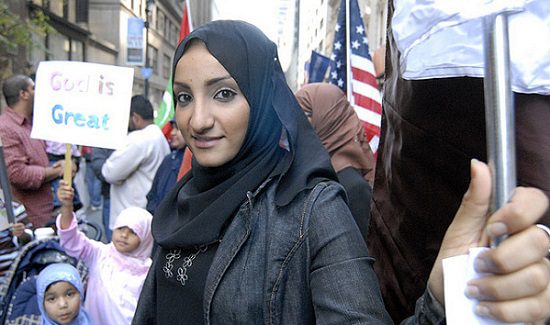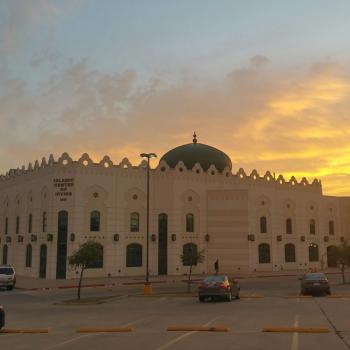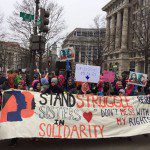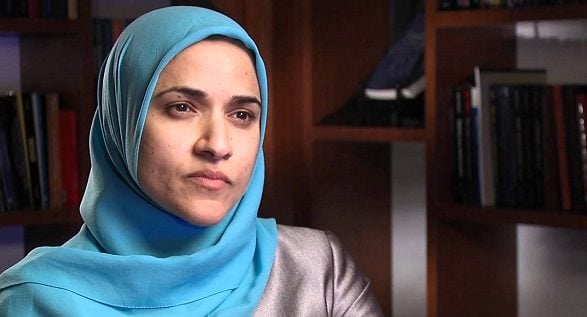
This post is part of Patheos’ Future of Religion Summer Series, focusing this week on the Future of Islam. Click here to read more perspectives.
One of the biggest lessons I’ve learned in 15 years of covering Muslims in America is this – we are surer of ourselves, stronger in our agreements and disagreements and proud and protective of our place as Muslims on a national and global stage.
At a kitchen table, though I own a desk set up in a study converted from a dining room, I sit and write. I report, I read, I research, I make calls, I conduct interviews, I make connections, I edit and I write. No matter what state that kitchen table has been in – Maryland, New York, Virginia – the focus has been the same – covering Muslim Americans and Islam in America.
Fifteen years on this beat, through the horrors of 9/11, the scrutiny turned on Islam and Muslims around the world, through the war in Iraq, the terror attacks in London, the Danish cartoon controversy, the growth of strength and pride in ourselves as Muslims, the rise of rock-star Imams and shaykhas, the emergence of Muslim artists, writers, social justice activists, politicians, government workers, advocates and allies – I’ve seen an immense resilience and pride bloom.
I see a future for Islam that is challenging, difficult, strong, burgeoning and glorious. A future couched in narrative discourse and continuing ijtehad (independent reasoning). A future where we have learned better (and are still learning) to dig into the issues we disagree on without tearing each other down. A future in which we fully realize that when we say to the outside community that Islam and Muslims are not a monolith, that we understand and believe that ourselves instead of a rush to judgment.
The past few years of my work as the Managing Editor of Patheos Muslim and the Editor-in-Chief of Altmuslim has taught me two things – more and more Muslims are owning their own faith and how they practice their faith without worrying about being “otherized,” and that debates on certain hot-button topics are providing deeply important and necessary lessons in how to conduct respectful intra-faith dialogue.
As we struggle through polarizing debates on such things as Countering Violent Extremism programs, the Muslim Leadership Institute and racism within Muslim culture, necessary discussions are occurring on how we can agree to disagree with adab, when it’s important to “air our dirty laundry” and when it’s important to respect the privacy of a debate, how to create true and lasting interfaith partnerships as well as the importance of being allies in social justice battles of other communities as well as how to incorporate hashtag-activism and social media justice into real-world change.
Some may see direness for the future of Islam, with the continuing terror being perpetuated by ISIS and other extremist groups coupled with recruiting tactics in other countries. These are things the vast majority in the Muslim community continue to worry about and be vigilant against.
But I also look at what is happening and what I see right in front of my eyes – in my home, with my children and the children of my friends. I see youth who are proud to be Muslim and American, who don’t shy away to discuss matters of faith and don’t feel like they need to hide the practices of their faith, unlike their parents (like me) growing up.
I see youth for whom the five daily prayers are becoming a real conversation with God rather than a ritual their parents make them do.
I see my children questioning me things we are teaching them — not to chide our faith, but to understand why we do the things we do and what God is trying to teach us. I see more and more the separation between what is beautiful about Islam and ugly about some Muslims. I see continuing suspicion and Islamophobia from some of the American (and global) population, but more and more Muslims shutting down such Islamophobia through the living of good lives.
Imam Khalid Latif recently wrote an article for Huffington Post on this very topic, in which he said the future of Islam is “every person who is able to find a value within themselves and in turn use that same perspective to find value in those around them. Every one that realizes the importance of their individual narrative as well learning the narrative of those around them.”
The future of Islam to me is one that recognizes and respects the tradition and past that it finds its roots in while understanding the needs and realities it lives in today. It appreciates ideas of continuity and change and looks to build a better existence for humanity on a whole. It doesn’t live in reaction to the worse stereotypes that people have of it. It no longer simply says “I am not violent, I am not a terrorist, I am not oppressive to women.” It no longer simply says what it is not, but it says what it is. It lives what it is and meets the discrimination of people by indiscriminately providing and helping everyone and anyone without condition and qualification. And not in response to the small-minded and bigoted, but simply because the purpose of Islam since its onset has been and continues to be to increase benefit and reduce detriment.
This is the future of our faith – not railing against what our faith isn’t, couching our vernacular in the terms of condemnation, but showing what our faith is through the living of true, honest, caring, friendly and love-filled lives.
In all my years of chronicling our autism journey and the joys and struggles our eldest son lives, one of the most important, albeit inadvertent, lessons my readers have learned is that our experiences are colored by our being Muslim — but our struggles, triumphs, low and high moments, yearnings, tears, pain and happiness are the same as everyone else’s.
That’s how I know the future of Islam holds great promise. Because we are living it fully and freely, and because humanity is the great equalizer.











